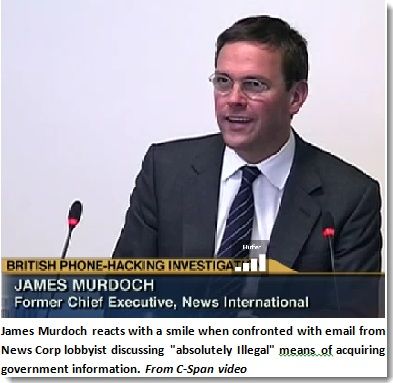What did we learn about Murdoch's treatment of the British people and system of government?
The high points were Murdoch's show of contempt for the political process and of his hyper focus on obtaining approval for the acquisition of remaining shares of the BSkyB (Sky) pay TV network. News Corporation already owned a controlling interest in Sky, 39%. (For the importance of the Sky acquisition, see Rupert watch - signaling the end, Michael Collins).
Contempt for the political process
Murdoch installs and topples British governments at his discretion using the power of his media properties. Despite steadfast support for PM Tony Blair and New Labour for over a decade, Murdoch switched his allegiance to David Cameron's Conservative Party in 2010. That change was a major factor in the defeat of Blair's successor, then-PM Gordon Brown.
David Cameron's public courtship of Murdoch was without shame. In May 2007, as Conservative opposition leader, the future PM hired Andy Coulson as Conservative Party communications director at the suggestion of Rebekah Brooks, a Murdoch insider and executive. Coulson was former News of the World editor who was up to his neck in phone hacking, about which he misled Parliament's early inquiries. (Guardian timeline)
In November 2008, Cameron wrote a column for Murdoch's favorite tabloid, The Sun, attacking BBC's leadership and its licensing fee. He said, "It's become bloated with many of its executives overpaid." He also insisted on reduction of the fee, a move that would curtail BBC revenues and the network's ability to compete with Murdoch's media proerties.
A few month later, in July 2009, Cameron gave a major policy speech in which he set his sights on Murdoch's number one regulatory nemesis, Ofcom, the British media regulatory agency. Cameron signaled to Murdoch what would happen to Ofcom and the identity of the Conservative MP likely to become secretary of culture, media, and sport.
"Jeremy Hunt has concluded that OFCOM currently has many other responsibilities that are matters of public policy.
"So with a Conservative Government, OFCOM as we know it will cease to exist."
The attack on BBC and plan to strip Ofcom of its powers, placing them in the hands of a sympathetic cabinet secretary ("Jeremy Hunt has concluded") were Cameron's way of saying that he would play ball with the head of News Corporation. It was part of Cameron's public audition for a role as a highly placed lackey.
Mr. Hunt made a fateful visit to News Corporation headquarters in New York City in August, 2009. He said he spent five days studying local television. Last week Murdoch testified that at this time he and son James were fine tuning the decision to buy the remainder of Sky shares.
Did Hunt indicate that a Cameron government would green light the Sky acquisition at the New York meeting?
Shortly after Hunt's mission, James Murdoch, then chairman of Sky, met with Cameron, promising Murdoch support for Cameron's bid to become prime minister. Cameron did become prime minister after he formed a coalition government in May 2010. He appointed Hunt secretary of culture, tried to pair back Ofcom, and froze BBC's licensing fee for several years. As inquiry evidence showed, Hunt delivered on the biggest action item -- support for News Corporations acquisition of the remaining shares of Sky that it didn't already own.Extensive email evidence shows that after Cameron assumed power, a robust back channel opened up between News Corporation's lobbyist, Frederic Michel, and Hunt's man at Culture, Media and Sport, Adam Smith.
The incriminating emails start in June 2010 and run through February 2011. Smith provided a blow-by-blow description of Hunt's efforts as well as previews of upcoming decisions. Michel fed Smith instructions and got confirmation when they were implemented.
Fast forward -- April 29, 2012. The Independent ran this headline:
(Note: You can view every article as one long page if you sign up as an Advocate Member, or higher).





